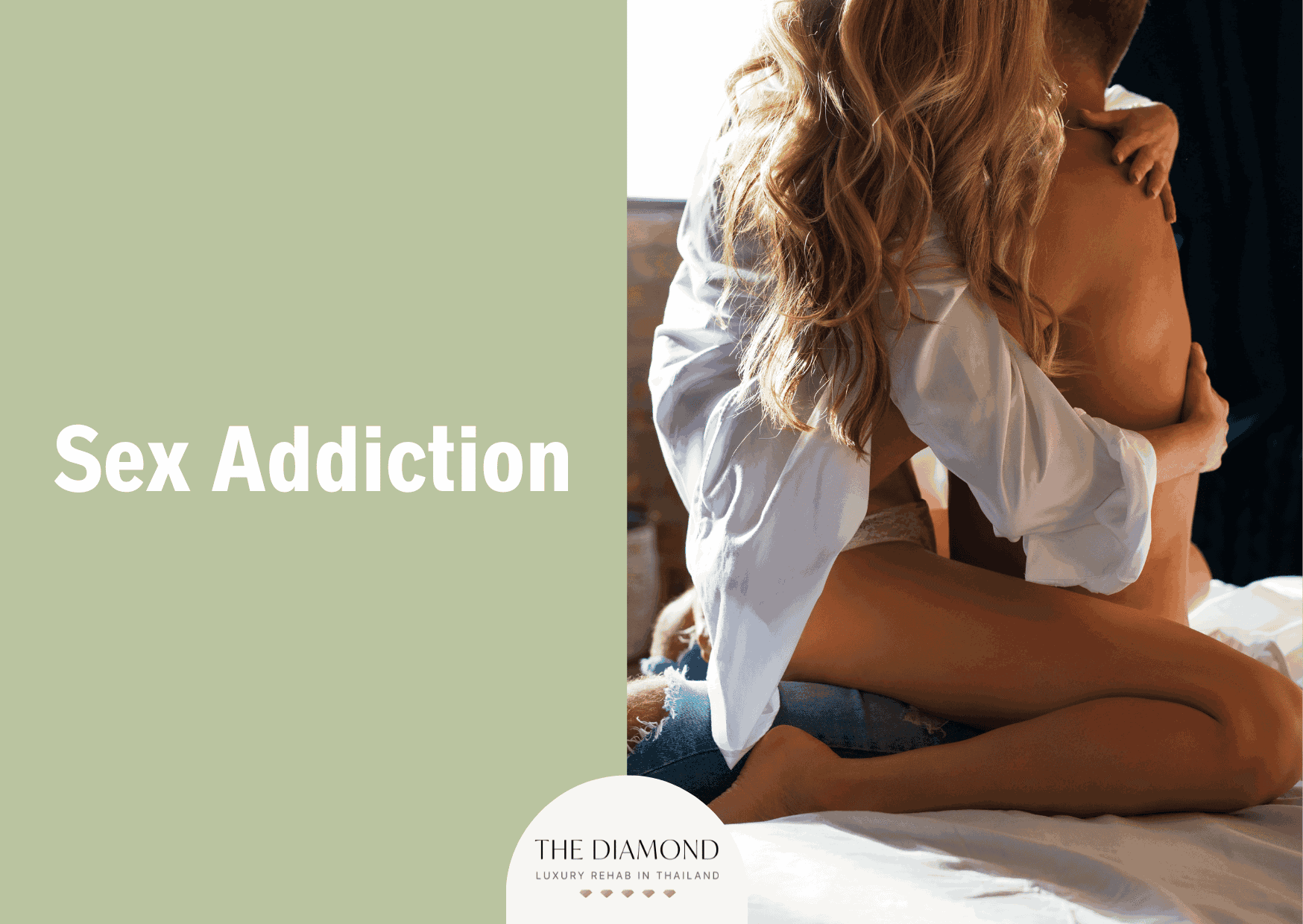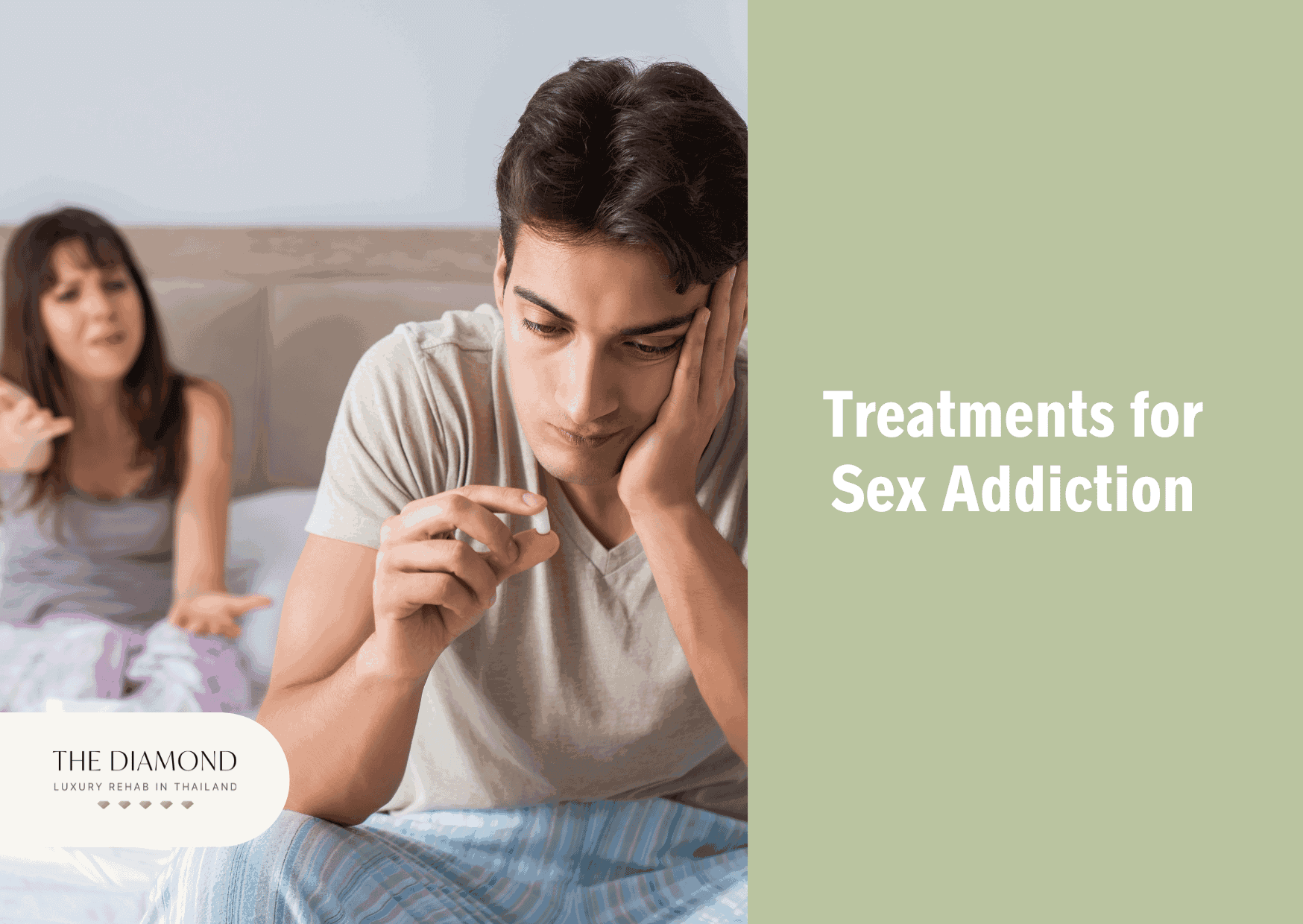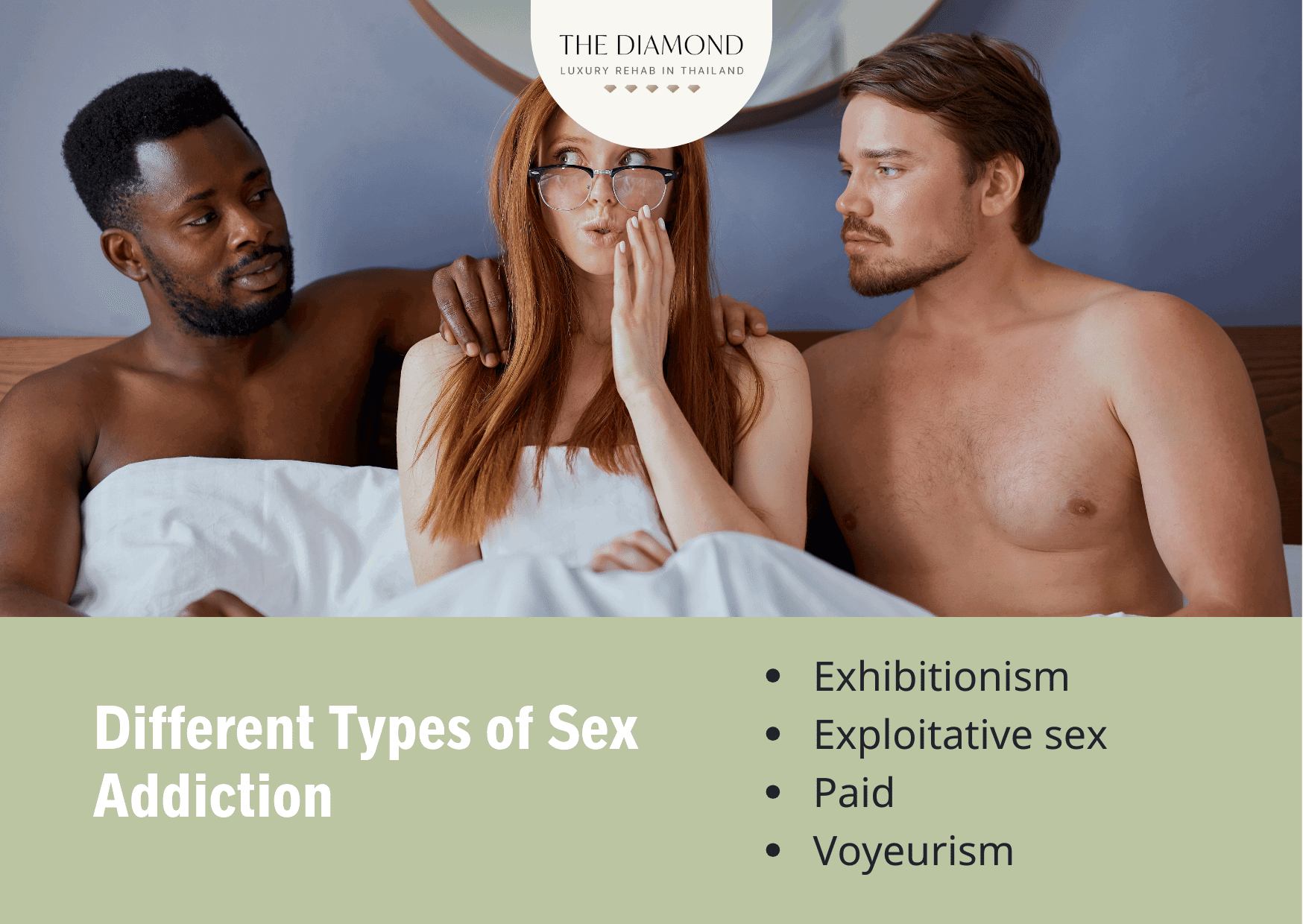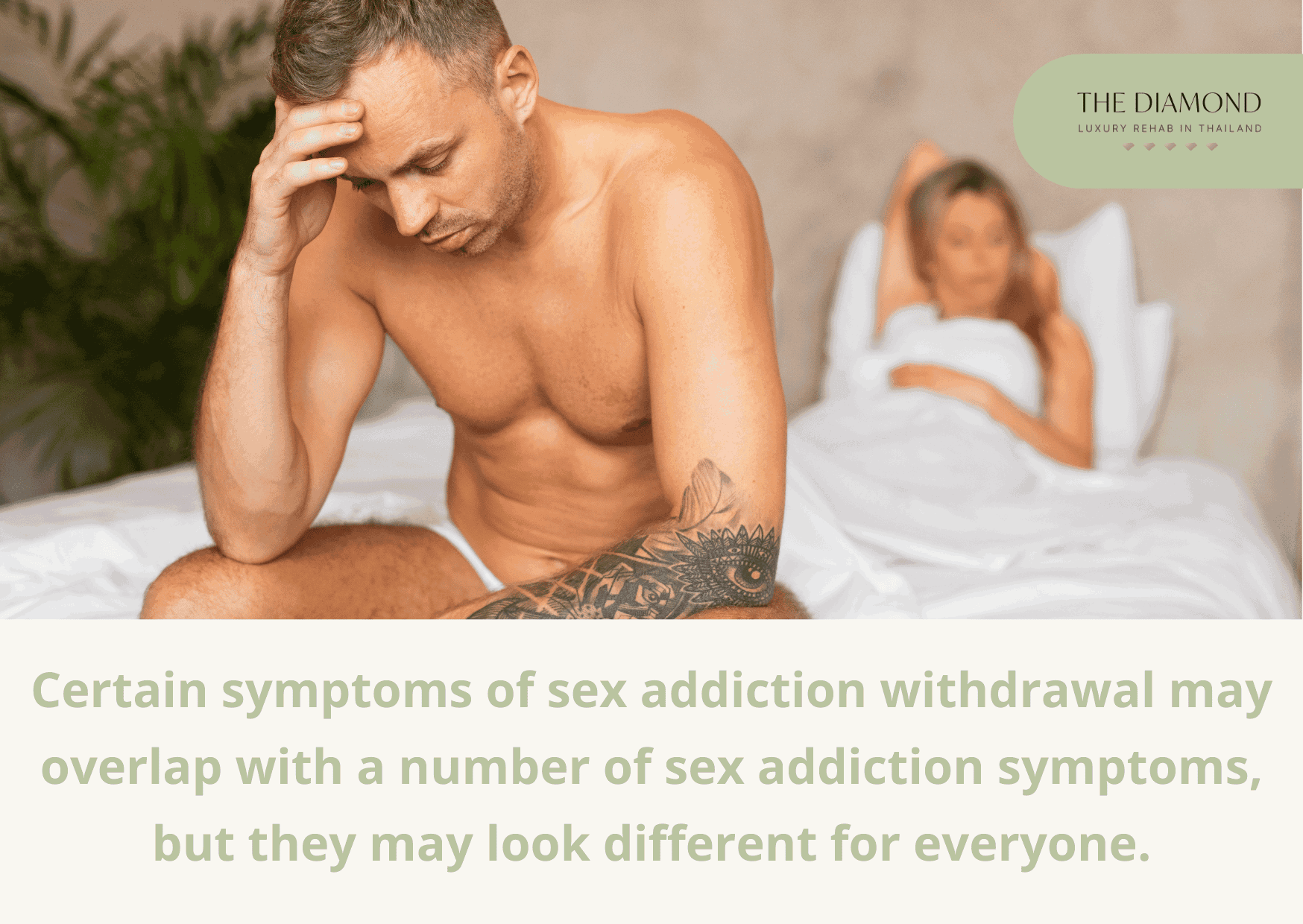Sex addiction symptoms and treatments
Table of content
- What is sex addiction?
- What are the symptoms of sex addiction?
- What are the causes of sex addiction?
- What are the effects of sex addiction?
- What are the treatments for sex addiction?
- What are the different types of sex addiction?
- What are the symptoms of sex addiction withdrawal?
- What are the symptoms of sex addiction dependence?

Sex addiction refers to the engagement in compulsive sexual acts despite negative consequences that may result from it.
Otherwise known as compulsive sexual behavior or hypersexuality disorder, the development of the condition can take a similar pattern with other addictions, such as substance abuse and alcohol use disorder.
What is sex addiction?
Sex addiction describes the behavior of a person who struggles to control sexual impulses. People suffering from the condition also reported having sexual fantasies in addition to obsessive thoughts and behaviors, according to a 2014 literature review on sexual addiction published in Current Pharmaceutical Design.
Sexual addiction may involve a wide array of commonly pleasurable sexual experiences, including masturbation, cybersex, pornography viewing, or multiple sexual partners.
What are the symptoms of sex addiction?
The symptoms of sex addiction can be physical or emotional.The most common symptoms of sex addiction are listed below.
- Physical symptoms: Sexual addiction can manifest itself in physical ways. The physical symptoms of sex addiction include a state of motionlessness due to sexual obsessions and excessive masturbation to the point of physical discomfort or pain.
- Emotional symptoms: Compulsive sexual behavior has a plethora of emotional symptoms. These include chronic thoughts of sexual fantasies, feelings of guilt and shame about sexual urges and the inability to control the behaviors, and showing strong disinterest in a partner. As a result, the partner of a sex addict may also feel alienated, angry, depressed, or humiliated and may eventually need treatment as well.
What are the causes of sex addiction?
The causes of sex addiction involve a complex interplay of different factors. The causes of sex addiction are listed below.
- Biological causes: The biological causes of sex addiction mainly involve a person’s unique physiology and genetics. Hypersexuality has been reported in patients with frontal lobe damage. This damage can trigger hypersexual behaviors, causing increased sexual activity and decreased control, according to a 2006 study by Timothy W. Fong, MD, published in Psychiatry (Edgmont). Meanwhile, some people who need help for sex addiction also have genetic vulnerabilities that can cause an inability to resist certain types of impulses. These individuals would be at an increased risk for developing sexual addiction.
- Psychological causes: Hypersexual behaviors can develop through a number of psychological factors, including co-occurring mental health disorders. Anxiety, depression, poor impulse control, or personality disorders are some of the mental health problems that can occur alongside sex addiction. Individuals with bipolar disorder are also more likely to engage in risky sexual behaviors.
- Social causes: Social influences can drive hypersexual behavior. A 2020 study on the gender-related differences in associations between sexual abuse and hypersexuality published in The Journal of Sexual Medicine states that these social influences include a history of childhood and adolescent sexual abuse, early exposure to sexual content, or family dysfunction. All these adverse events are significantly associated with sexual addiction.
What are the effects of sex addiction?
The effects of sex addiction include serious consequences in a person’s life. The effects of sex addiction are listed below.
- Biological effects: Sex addiction can result in a number of medical complications, including certain sexually transmitted diseases (STDs) such as genital herpes, gonorrhea, syphilis, and the potentially fatal human immunodeficiency virus (HIV).
- Psychological effects: Examples of psychological consequences of sexual addiction include increased feelings of guilt and shame at compulsive sexual acts and the secrecy involved, shame, low self-esteem, intense anxiety, or severe depression that is often accompanied by suicidal ideation.
- Social effects: Individuals suffering from sex addiction are more likely to experience damaged personal relationships, separation, and divorce. Compulsive sexual behavior can also result in decreased work productivity or attendance due to the preoccupation with sexual thoughts and fantasies.
What are the treatments for sex addiction?

The treatments for sex addiction include medications, inpatient treatment, 12 step programs, and cognitive behavioral therapy (CBT).
Treatments may vary depending on the underlying cause and how it affects the addict’s life. Several factors contribute to the development of compulsive sexual behaviors and no exact symptoms constitute what is a sex addict.
Certain drug therapies may work for some people whose sex addiction is associated with an underlying anxiety disorder or mood disorder. The use of medications in such cases may be useful in reducing compulsive urges linked to sexual addiction.
Several rehab centers offer sex addiction recovery programs. In inpatient therapy, the patient is taken away from the temptations of everyday life and resides at the recovery facility for at least 30 days. Inpatient treatment helps the addict focus on the healing process and regain control of sexual impulses.
Another treatment option for sex addiction are 12-step programs such as Sex Addicts Anonymous (SAA). 12-step recovery programs offer a good support system through group meetings with other individuals dealing with the same addictive behaviors.
Cognitive behavioral therapy (CBT) is a form of therapy used by a licensed mental health professional to help individuals struggling with sexual addiction identify what triggers sexually destructive behaviors. The ultimate goal of CBT is to alter self-destructive thoughts and gain control over them.
What is the difference between sex addiction and porn addiction?
The key difference between sex addiction vs. porn addiction is the subject of satisfaction for the addict. Sex addiction directly involves other people in satisfying sexual urges. On the other hand, porn addiction only involves a screen or other pornographic material that the person is viewing.
The sex addict definition is someone who constantly hunts for new partners and new means to satiate sexual urges. Therefore, sex addicts are often extroverted and always eager to mingle.
Meanwhile, people who are addicted to pornography are more likely to be introverted and may prefer to stay at home.
What is the difference between sex addiction and sex offenders?
The difference between sex addiction and sex offenders is that sex addiction is a condition characterized by the inability to control one’s sexual urges while sex offenders are people who have been convicted due to engagement in a criminal sexual act that is often against the will of the other person involved.
In other words, a sex addict engages in certain consensual sexual behaviors that end up affecting personal relationships and quality of life. However, a sex offender engages in nonconsensual sexual activity.
What is the relation between sex addiction and mental health disorders?
There is a significant association between sexual addiction and mental health conditions such as mood and personality disorders. In fact, the connection of sex addiction to mental health disorders is supported by research.
According to a 2010 study by Ortigue et al., published in The Journal of Sexual Medicine, 40% of individuals who struggle with compulsive sexual behaviors also have a history of mood disorders including depression.
Clinical depression often occurs alongside sex addiction. The link between depression and sexual addiction may explain why antidepressants are helpful in sexual addiction treatment.
What are the different types of sex addiction?

The different types of sex addiction involve several sexual behaviors one might engage in if they have the condition. The different types of sex addiction are listed below.
- Exhibitionism: Sex addicts who are exhibitionists get satisfaction from flashing genitalia and eliciting reactions from people in public. Exhibitionism is a more risky type of sex addiction as there is always the possibility of getting caught.
- Exploitative sex: engaging in sexual activity that involves vulnerable populations such as children or disabled individuals. Satisfaction is obtained from the power that the aggressor has over the victim.
Intrusive sex: involves touching someone in a sexual manner without the person’s consent. Someone suffering from sex addiction will touch the private parts of a victim often in a public place to easily escape. - Paid sex: allows a person to have an unlimited stream of willing sexual partners. This involves using prostitutes, paying for phone sex, or webcam sex.
- Voyeurism: spying on unsuspecting victims using binoculars or a hidden camera. The addict is sexually turned on while watching the victim during intimate moments such as getting dressed, showering, or even having sex.
The most common types of sex addiction are exhibitionism, exploitative sex, intrusive sex, paid sex, and voyeurism.
How would you know if you are addicted to sex?
You would know if you are addicted sex if you are unable to control your sexual behavior despite clear negative consequences. Additionally, as mentioned in the ‘what is addiction’ section, individuals struggling with sex addiction become excessively preoccupied with sexual thoughts or behaviors that give the desired effect.
A person addicted to sex spends a significant amount of time thinking about or engaging in sexually addictive behaviors. Examples of addictive acts include compulsive masturbation, having multiple affairs or one-night stands, viewing pornographic material, or having contacts with prostitutes.
Can sex addiction be treated?
Yes, sex addiction can be treated with the help of a medical professional like a psychiatrist, psychologist, or sex therapist. Although not currently recognized as a diagnosable condition, the treatment for sexual addiction takes a similar path with other addictions like substance misuse disorder.
A team of experts is often involved in the treatment of the disorder. Mental health professionals will guide a person on how to overcome sexual addiction and address the factors that trigger the compulsive behavior.
Are there sex addiction drug medications available?
No, there is currently no U.S. Food and Drug Administration (FDA)-approved sex addiction drug medication available in the market. It is worth noting, however, that some people who suffer from the condition may benefit from the use of medications.
This is applicable in cases where sex addiction co-occurs with certain mental health conditions such as anxiety and depression. Medications that may be used in providing sex addiction help include antidepressants and mood stabilizers, according to a 2023 article on sex addiction from MedicineNet.
In general, antidepressants and mood stabilizers act on brain chemicals associated with addictive behaviors, ultimately reducing compulsive sexual urges.
How does sex addiction affect the brain?
Sex addiction affects the brain in ways that are similarly seen in drug addicts when consuming drugs. Evidence exists that food, drugs, and sex all share the same pathway to the reward system in the brain.
For instance, in a 2014 study conducted by researchers from the University of Cambridge and published in PLOS ONE, study authors looked at brain activity in 19 men with sex addiction and 19 men without the disorder. While viewing pornography, the participants affected by compulsive sexual behavior showed greater activity in the areas of the brain involved in processing reward and motivation compared with the healthy volunteers.
The same areas of the brain become highly activated in people with drug addiction when using drugs.
This may explain why a sex addict’s judgment becomes impaired as the brain encourages the person to engage in risky behaviors in pursuit of the reward experience. Certain sex addiction recovery programs address the condition by aiming to alter thoughts of engaging in sexual behaviors.
How to overcome sex addiction

A person may overcome sex addiction by reaching out for support. Sex addiction rehab centers exist to provide the right treatment for a person, including support groups.
However, the first step to getting support is finding a trusted person to confide in. Trusted persons may include family members, friends, or a significant other. It is worth remembering that the sex addiction definition is the inability to control sexual impulses and involves persistent thinking about sex.
Having one person listen to these thoughts and desires can help a person be more confident about reaching out to more people. In 12-step recovery programs, group meetings consist of people who share the same experiences about struggling with sex addiction. Having proper treatment for compulsive sexual behavior is equally important as having a strong support system.
A support group may help fill a gap between medical treatment and the need for quality emotional support.
Is sex addiction treated in rehab?
Yes, sex addiction can be treated in rehab if the person is willing to accept professional help. The appropriate therapeutic approach may depend on the sex addict’s needs, motivation levels, and co-occurring conditions. Sex addiction can be treated in rehab through the following therapeutic approaches:
- Cognitive behavioral therapy (CBT): helps a patient shift the focus of self-destructive thoughts and behaviors. CBT also provides sex addicts with new coping skills for the future.
- Inpatient therapy: requires the person to live in a treatment center while receiving treatment, away from daily stressors. Residential or inpatient programs offer a comprehensive treatment plan in a therapeutic environment.
- Outpatient therapy: allows an individual to remain at home while receiving treatment. Outpatient treatment is tailored to a sex addict’s unique and individual needs.
- Medications: Medications may be prescribed in rehab to help control sexual impulses and treat symptoms of depression and anxiety.
- 12-step recovery program: acknowledges the powerlessness of an individual in the face of addiction and the willingness to live a life without it.
- Counseling: Involves therapeutic sessions with a counselor who can help a patient address issues that are typical of sex addiction.
When is sexual addiction counseling necessary?
Sexual addiction counseling is necessary when moving individuals past obsessions and compulsions. The main goal of counseling is to navigate through and rectify the underlying causes that resulted in the development of sex addiction.
Counselors can help people get to the roots of sex addiction and address different issues that co-occur with the disorder, including depression, anxiety, low self-esteem, or codependency. Having therapeutic sessions with a licensed therapist is a step towards more positive relationships and a healthier outlook in life.
People may benefit from the different types of counseling, including individual, couples, and group therapy, according to a 2007 study by Mark H. Bird published in the Journal of Marital and Family Therapy.
What are the symptoms of sex addiction withdrawal?

Certain symptoms of sex addiction withdrawal may overlap with a number of sex addiction symptoms, but they may look different for everyone. The most common symptoms of sex addiction withdrawal are listed below.
- Increased irritability: Irritability is common in sex addicts during recovery. The abrupt changes in behavior can cause anxiety, leading people to become more irritable or grumpy.
- Anxiety: Some people experience feelings of loss that come with making big life changes. This can lead to increased feelings of anxiety in individuals.
- Depression: Recovering from compulsive sexual behavior can make someone more aware of the effects sex addiction had on one’s quality of life. Realizing the lack of connection with a partner or damaged relationships with other people can lead to intense feelings of depression.
- Loss of interest in daily life: During sex addiction recovery, one may experience loss of interest in many things, even in sex itself. As a result, it can be hard for someone in recovery to stay mentally present.
- Intense cravings: Abstaining from sex means the brain gradually learns to adjust to decreased levels of dopamine. This creates intense cravings for sexual activity as the person was once fixated on the dopamine rush.
- Restlessness: A person in recovery may experience restlessness as a result of making drastic life changes. Severe unease with one’s overall circumstances is also common and may make it difficult for someone to stick to long-term plans during treatment.
- Sexual avoidance: Intense feelings of guilt and shame may lead someone to avoid sex altogether. An individual can feel unworthy of sex because of the intense shame being experienced.
What are the symptoms of sex addiction dependence?
The symptoms of sex addiction dependence can manifest in physical and emotional ways. The most common symptoms of sex addiction dependence are listed below.
- Persistent thoughts about sex: One symptom that is common to people with sex addiction dependence is chronic thoughts of sex and sexual fantasies. This may become obsessive and may end up interfering with a person’s daily responsibilities. Intense sexual urges and behaviors are often addressed in sex addiction treatment by reevaluating thoughts and ultimately gaining control over compulsive behaviors.
- Sexual activities with multiple partners: Sex addicts may constantly look for other sexual partners to satisfy sexual urges. This often results in extramarital affairs and engagement in sexual acts with multiple partners, including strangers.
- Exclusion of other activities: Once fixated on sex, a person may neglect other activities as a result of prioritizing sexual desires above everything else. A person may let go of family commitments or job responsibilities.
- Inappropriate or risky sexual behaviors: A sex addict may engage in inappropriate or risky sexual behaviors, including exhibitionism, sex with prostitutes, or public sex.
- Excessive masturbation: A person addicted to sex may develop an unhealthy habit of masturbating, especially when alone. At times, masturbation is done even in inappropriate times or even to the extent of causing physical discomfort.
- Feelings of guilt after sex: Feelings of guilt and shame are common with any kind of addiction. In the case of sex addiction, a person may be trapped in a vicious cycle of feeling sexually satisfied one moment, and then feeling remorse the next.
- Inability to control sexual behaviors: A person suffering from sex addiction may have numerous unsuccessful attempts to stop engaging in compulsive sexual behaviors.

